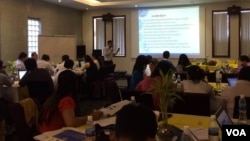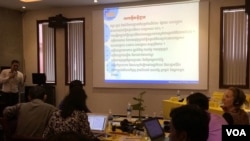A United Nations agency will soon begin holding public meetings nationwide to consult the public on a long-awaited law that would give Cambodians access to important information held by the government.
Representatives of local and international nongovernmental organizations met in Phnom Penh on Friday to put forward their views on the touted Access to Information Law.
The government has been working on a draft of the law for at least a decade. Supporters say that if it finally comes to fruition, the legislated could help combat Cambodia’s endemic corruption and aid advocates by making the government release vital information about how the country is governed.
Government spokesman Phay Siphan said the law was being worked on by officials under Information Minister Khieu Kanharith in coordination with Unesco, the United Nations Educational, Scientific and Cultural Organization.
Anne Lemaistre, head of Unesco’s office in Cambodia, said the agency was providing technical assistance to the government on the law. Friday’s event, she said, was intended to give NGOs a chance to have their say on the law.
“From this event we would like to have their input into the draft law, so we want to collect their ideas for them to share their experiences and we want this to be reflected into the drafting of the law,” she said.
She said the agency was also preparing to hold meetings with the public in Cambodia’s provinces, emphasizing that the process must be “consultative.”
“We will have provincial forums and [forums] in remote areas in Cambodia, and we try to include people usually being not heard,” she said.
“What we try to do is to be as inclusive as possible and to be able to associate to this drafting of the access to information law, of course disabled people, of course ethnic minority people, and of course people living in remote areas.”
Suon Bunsak, chief of secretariat at the Cambodian Human Rights Action Committee, said the government should prioritize the Access to Information Law above other legislation as it could help reduce corruption in the country.
“For example, regarding the current land conflict, we want the government—especially at the sub-national level—to disseminate the information. [They should say] that they’ve solved the land issue here, and this part we have not solved and we are waiting for a technical solution,” he said. “They should make it clear in public.”
Tan Nearin, an administrative officer from Cambodia Women's Crisis Center—which helps girls and women who suffer domestic violence or human trafficking—said that in her organization’s work, difficulties arise because the government is not transparent about the numbers of survivors.
“I want us to be able to know the statistics regarding the victims or issues happening anywhere. We want regional statistics on this,” she said.
Across a number of issues, Nearin added, groups were restricted by the lack of available information.
“If we do not get clear information, it is hard for us to help people,” she said. “For example, there may be some severe victims in some places, but we do not have enough information, so it is hard for us to help them. It means our assistance arrives late and they are even more affected.”
Tep Kuntheara, deputy director for the Phnom Penh-based Advocacy and Policy Institute, said that the draft law should make sure that disabled people have access to information, in particular those with visual or aural impairments.
“For example, on TV in some countries, when they broadcast they have sign language that we can watch,” he said. “We cannot overlook this point, since the disabled people have already suffered in their lives.”





